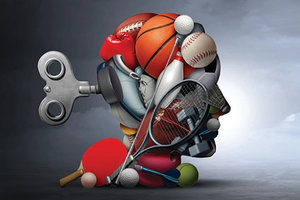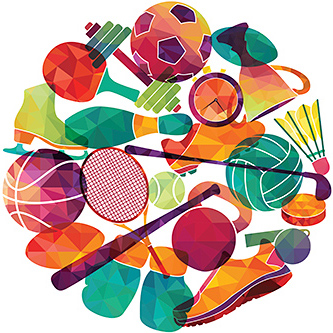Athletes are known for their ability to push their bodies beyond the physical brink. This level of drive can help athletes better survive the new world we live in due to the coronavirus. But COVID-19 is still taking its toll on this segment of the population, even if they are able to avoid catching the virus itself.
Lenzner equates this feeling of uncertainty with being lost at sea. "You have no idea when you'll get to land. No idea when you'll get rescued. Everything is up in the air." This notion is completely foreign to athletes because they always have an objective in mind. "Its pervasive to all of their behaviors or habits," he says.
 This is true whether they play in the big leagues or are recreationally active. With so many variables now up in the air, their mental game is thrown off. How can chiropractors help this demographic of patients mentally begin to navigate the "new normal"?
This is true whether they play in the big leagues or are recreationally active. With so many variables now up in the air, their mental game is thrown off. How can chiropractors help this demographic of patients mentally begin to navigate the "new normal"?
1. Check in With Them
"Sometimes when we just check in and say, ‘Hey, I hope everyone in your family is safe and well,' it gets them to open up," says Lenzner. This allows them to share what is going on in their mind. It also enables you to start the conversation about their mental health.
Through his business, Lenzner has coached professional athletes and organizational leaders in a variety of pro sports, as well as some of the military's most elite special forces. "Ultimately, they'll come back and say, ‘Remember that time we sat down and just rapped over food? That was the best time.' More than anything else, they just want someone to listen," Lenzner says.
When checking in with your athletic patients, ask open-ended questions. Examples included: "Tell me about how you're doing" or "What do you think about what's going on?" The reason these types of questions are valuable is because "we learn so much more," says Lenzner.
Admittedly, not all athletes are going to come out and say when they're struggling. That's why it's also important to look for nonverbal cues. "Whether it's weight changes, their voice, or the speed in which they're speaking," Lenzner says all of these could be signs the athlete is having a difficult time. Heavy bags under their eyes might also signal they're not doing well adjusting.
2. Reinforce Routine
Athletes strive on routine. Whether it is routine in their training schedules, their diet or any other aspects of their days or weeks, they know that if they do "A," the result will be "B." With so many unknowns right now, this uncertainty impedes their normal way of thinking. It sets up a sort of stumbling block they may not know how to get past.
To help athletes work around this issue, emphasize the importance of developing some type of routine. Ideally, this routine should include three categories of activities, says Lenzner: spark, perform and recharge.
"A ‘spark' is something that motivates you for the next situation," Lenzner explains. It's like how making your bed every morning motivates you take even more positive actions as you go about your day. It sets into motion a domino effect.
"'Perform' is something you're doing for your sport," says Lenzner. This includes taking actions such as working out or going on a bike ride. Keeping regular chiropractic visits falls under the perform category as well.
Items in the "recharge" category could include eating the right foods, getting adequate sleeps and engaging in meditation. These are things that will help the athlete create and maintain the energy needed to perform. Sometimes, recharge actions are interchangeable with perform actions.
3. Encourage Goal Setting
Setting daily goals can also help athletes get back into the game mentally. Working toward something provides a sense of structure in a world in which the directives seem to change by the day.
Encourage them to set goals in each of the three categories (spark, perform and recharge). This helps them continue to make improvements both physically and mentally. It gives them something to work on when it feels so much is out of their control.
One place they can keep their goals is in a performance journal. Lenzner calls this journal "one of the most underrated tools" for athletes. He even gives each of his clients a pre-made journal that comes with questions he wants them to answer each day. In addition, he may ask them to write down what they're grateful for or what their objectives are.
If they roll their eyes at the thought of keeping a journal, understand that it may take them some time to warm up to the idea. It takes some of Lenzner's clients years before they realize the value a journal provides, providing their mind the same type of benefits as warming up provides their body.
Embrace Your Opportunity
As a chiropractor, you are in a unique position to help athletes create the right mindset during and after the pandemic. Talk to them about their fears and goals. If they're doing things that aren't good for their bodies, encourage them to change that behavior or get rid of that substance. Help them see where their strengths lie so they know what characteristics they can fall back on to help them through these uncertain times.
"Any time we connect and engage, it opens this channel and there's trust," says Lenzner. "Muscles relax and the mind opens up."
Click here for more information about Spencer Baron, DC, DACBSP.





